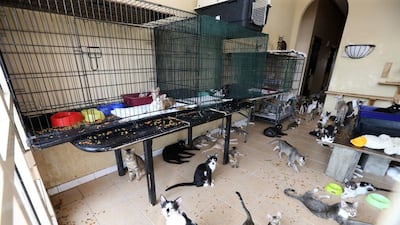DUBAI // More than 100 cats and dogs, most of which are in need of medical treatment, are to be seized from a villa in Mirdif next week after an animal welfare charity secured a court order to take the animals.
German Petra Mueller, 64, has been living in a four-bedroom house with 150 cats and nine dogs for the past three years.
“Everybody knows that I had the Arabian Mau discovered and for this reason, for this study, I have many cats,” she said. “I know I have more cats [than I should].”
In 2008, the Arabian Mau was recognised as a distinct breed.
Ms Mueller contributed to that achievement after breeding the animals for six generations to ensure that features thought to be specific to the breed remained unaltered.
Ms Mueller, who has lived in Dubai for 24 years, has 50 cats from the study and 100 given to her by concerned residents.
“I don’t take cats in, people give them to me,” she said. “If they found a cat on the [street] they say, ‘Petra, please, we don’t know what to do, and the vet wants to put it down’,” she said.
She tried to provide treatment required and a temporary home until they were permanently adopted.
“I’m an environmental consultant for air, water and soil pollution,” she said. “This how I earn my money, and the cats are my love. Some people say [I] am crazy. Yes, I am. I don’t party, I don’t buy jewels.”
The Middle East Animal Foundation (MEAF) pursued a court order to seize the animals on the grounds of concern for their welfare.
Ms Mueller and MEAF co-founder Mahin Bahrami said the move to take the animals was an amicable one.
“I am very happy to get help for rehoming the cats and for treatment,” said Ms Mueller.
“[MEAF] wanted a court order because they did not know how I would react but we are friends.
“Whatever is in the interest of the cats.”
Ms Mueller repeated that her aim was not to collect cats.
Ms Bahrami said the foundation was happy to help house and treat the cats.
“Most of these animals are sick and we hope this situation sheds light on the fact that there needs to be stricter laws on housing animals,” she said.
“There needs to be more regulation on the number of animals that are kept indoors and there needs to be regular inspection in the animal welfare community.”
The smell in the villa was overwhelming, and as a safety precaution, all personnel were required to wear shoe covers.
In almost every corner, there was a cat either grooming, sleeping or eating.
On Wednesday, MEAF noted down the animals that need to removed, while an officer from Dubai Municipality and another from Dubai Police, supervised the situation in line with the court order.
Meanwhile, Dr Dieter Malleczek, owner of Blue Oasis Veterinary Clinic, said he had warned Ms Mueller in 2009 about not taking in too many animals, adding that he ended his service after non payment of more than Dh4,000.
“She owes Dh4,394.80 after a multi-pet discount, and she never paid one fils,” he said.
“She also did not listen to [my] advice when she was still residing in a previous villa in Umm Suqeim, where she had to leave after neighbours complained.”
Ms Mueller admitted that she had outstanding vet bills and said she took it upon herself to treat the animals but could not always afford to do so.
“People should know that I take the animals to the vet then I have to pay the bill but I already pay so much for food and to the guys who are cleaning, and sometimes I don’t have enough money,” she said. “If people can [donate] money to the clinics, I am more than happy.”
Anyone wishing to help can contact MEAF by sending an email to contact@me-af.org.
dmoukhallati@thenational.ae

